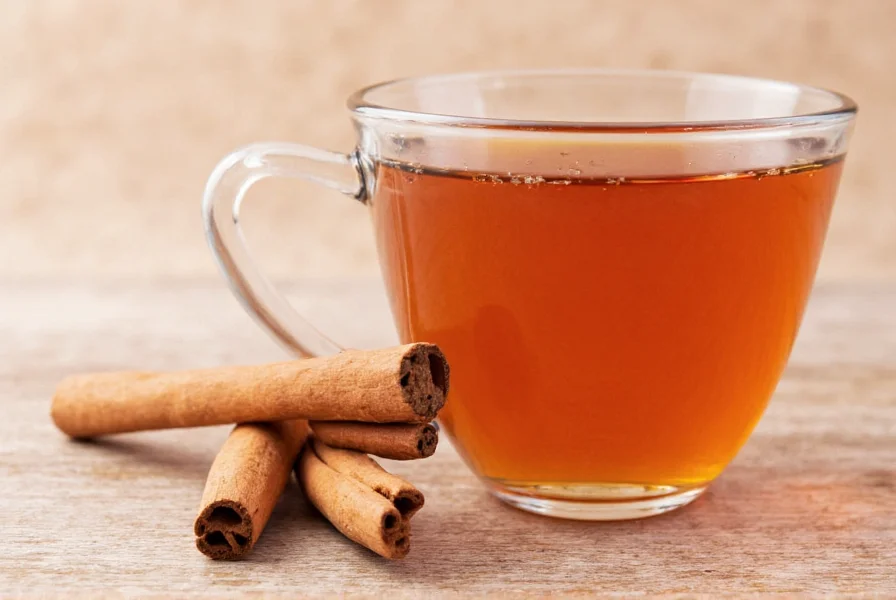Cinnamon tea has been valued across cultures for centuries, not just for its warm, sweet-spicy flavor but for its potential health-supporting properties. This simple infusion, made by steeping cinnamon sticks or powder in hot water, delivers bioactive compounds that may contribute to wellness when incorporated as part of a balanced lifestyle. Unlike medicinal treatments, cinnamon tea serves as a complementary beverage with multiple traditional and research-supported applications.
What Makes Cinnamon Tea Beneficial
The primary active compound in cinnamon tea is cinnamaldehyde, which gives cinnamon its distinctive aroma and flavor while contributing to many of its potential benefits. Cinnamon also contains polyphenols and other antioxidants that help combat oxidative stress. When prepared as tea, these compounds become water-soluble, making them readily available for absorption when consumed.

Top Evidence-Based Cinnamon Tea Uses
Blood Sugar Regulation Support
Multiple studies suggest cinnamon may help maintain healthy blood sugar levels. Research published in the Journal of the Academy of Nutrition and Dietetics indicates that cinnamon consumption could improve insulin sensitivity. When consumed as tea, cinnamon's compounds may help slow gastric emptying and reduce post-meal blood sugar spikes. For this purpose, drinking cinnamon tea before or with meals shows particular promise.
Antioxidant Protection
Cinnamon ranks among the most antioxidant-rich spices. A study in Oxidative Medicine and Cellular Longevity found cinnamon's antioxidant capacity exceeds many fruits and vegetables. These antioxidants help neutralize free radicals that contribute to cellular damage. Regular consumption of cinnamon tea provides a steady supply of these protective compounds without the added sugars often found in other antioxidant beverages.
Digestive Wellness
Traditional medicine systems have long used cinnamon tea for digestive support. Modern research suggests cinnamon may help relax gastrointestinal tract muscles and reduce spasms. The warm liquid combined with cinnamon's natural properties can soothe occasional digestive discomfort, particularly after rich meals. Many people find relief from occasional bloating by sipping cinnamon tea 20-30 minutes after eating.
| Preparation Method | Best For | Steeping Time |
|---|---|---|
| Whole cinnamon sticks | Blood sugar support | 10-15 minutes |
| Cinnamon powder | Quick antioxidant boost | 5-7 minutes |
| Cinnamon with ginger | Digestive support | 8-10 minutes |
| Cinnamon with honey | Immune support | 7-9 minutes |
Inflammation Reduction
Chronic inflammation underlies many health concerns. Cinnamon contains compounds that may help modulate the body's inflammatory response. A review in Nutrients highlighted cinnamon's potential anti-inflammatory effects through multiple pathways. While not a replacement for medical treatment, regular cinnamon tea consumption may contribute to an overall anti-inflammatory lifestyle approach.
Heart Health Support
Preliminary research suggests cinnamon may support cardiovascular health by helping maintain healthy cholesterol levels and blood pressure. The antioxidants in cinnamon tea may help protect blood vessels from oxidative damage. For heart health benefits, consistent daily consumption appears more effective than occasional use.
Immune System Support
With its combination of antioxidants and antimicrobial properties, cinnamon tea may provide gentle immune system support. During cold and flu season, many people incorporate cinnamon tea into their wellness routines. The warming nature of the tea combined with cinnamon's properties creates a comforting beverage that may help maintain respiratory comfort.
Metabolic Wellness
Emerging research suggests cinnamon may support healthy metabolism. Some studies indicate it could help maintain healthy triglyceride levels. While more research is needed, incorporating cinnamon tea into a balanced diet shows promise as part of a metabolic wellness strategy.

How to Prepare Cinnamon Tea for Maximum Benefits
To prepare effective cinnamon tea, start with high-quality cinnamon. Ceylon cinnamon (often called "true cinnamon") generally contains lower levels of coumarin than Cassia cinnamon, making it preferable for regular consumption. Here's a simple preparation method:
- Bring 8-12 ounces of filtered water to just below boiling (200°F/93°C)
- Add 1-2 inches of cinnamon stick or ½ teaspoon cinnamon powder
- Steep for 10-15 minutes (longer for stronger flavor and more compound extraction)
- Strain and enjoy plain or with lemon or a small amount of raw honey
For specific purposes, consider these variations:
- Blood sugar support: Add a slice of fresh ginger and steep for 12 minutes
- Digestive aid: Include a small piece of crushed cardamom pod
- Immune support: Add lemon juice after steeping to preserve vitamin C
Safety Considerations and Potential Side Effects
Cinnamon tea is generally safe for most adults when consumed in moderate amounts (1-2 cups daily). However, certain precautions apply:
- Cassia cinnamon contains higher coumarin levels, which may cause liver issues with excessive consumption
- Those taking blood thinners should consult their healthcare provider before regular consumption
- Pregnant and breastfeeding women should limit intake to culinary amounts
- May interact with diabetes medications - monitor blood sugar closely
- Discontinue use if experiencing mouth sores or allergic reactions
For regular consumption, Ceylon cinnamon provides similar benefits with lower coumarin content. Most experts recommend limiting daily cinnamon intake to 1-2 teaspoons of powder or 2-4 inches of stick form.
Integrating Cinnamon Tea Into Your Wellness Routine
For best results, incorporate cinnamon tea consistently rather than occasionally. Morning consumption may support healthy blood sugar throughout the day, while evening tea could aid digestion after dinner. Pairing cinnamon tea with other healthy habits creates a synergistic effect greater than any single intervention.
Remember that cinnamon tea works best as part of an overall wellness approach that includes balanced nutrition, regular physical activity, adequate sleep, and stress management. While research shows promise for various cinnamon tea uses, it should complement rather than replace conventional medical care for specific health conditions.
Frequently Asked Questions About Cinnamon Tea Uses
How often should I drink cinnamon tea for health benefits?
For general wellness, 1-2 cups daily provides benefits without risk of side effects for most people. Those using cinnamon tea for specific purposes like blood sugar support may benefit from consuming it before meals. Consistency matters more than quantity - daily consumption over weeks shows better results than occasional large amounts.
Can cinnamon tea help with weight loss?
Cinnamon tea alone won't cause weight loss, but it may support metabolic health as part of a comprehensive approach. Some research suggests cinnamon could help maintain healthy blood sugar levels, which may reduce cravings and support balanced eating. Replacing sugary beverages with cinnamon tea can also reduce calorie intake. However, significant weight management requires dietary changes, physical activity, and other lifestyle factors.
What's the difference between Ceylon and Cassia cinnamon for tea?
Ceylon cinnamon ("true cinnamon") has a more delicate flavor and contains significantly less coumarin than Cassia cinnamon. For regular tea consumption, Ceylon is generally preferred due to its lower coumarin content, making it safer for daily use. Cassia has a stronger, spicier flavor but higher coumarin levels, which may cause issues with prolonged, high consumption. Both types offer similar health benefits, but Ceylon provides a better safety profile for regular tea drinkers.
When is the best time to drink cinnamon tea?
The optimal time depends on your purpose. For blood sugar support, drink before or with meals. For digestive benefits, consume 20-30 minutes after eating. Morning consumption may provide sustained energy throughout the day, while evening tea can aid digestion of dinner. Some people enjoy it throughout the day as a healthy alternative to coffee or sugary drinks. Listen to your body's response to determine what timing works best for you.
Can I drink cinnamon tea if I have diabetes?
Many people with diabetes safely enjoy cinnamon tea, but you should consult your healthcare provider first. Research suggests cinnamon may help maintain healthy blood sugar levels, but it could potentially enhance the effects of diabetes medications, leading to blood sugar that's too low. If approved by your provider, start with small amounts (½ cup daily) and monitor your blood sugar closely to understand your personal response.











 浙公网安备
33010002000092号
浙公网安备
33010002000092号 浙B2-20120091-4
浙B2-20120091-4